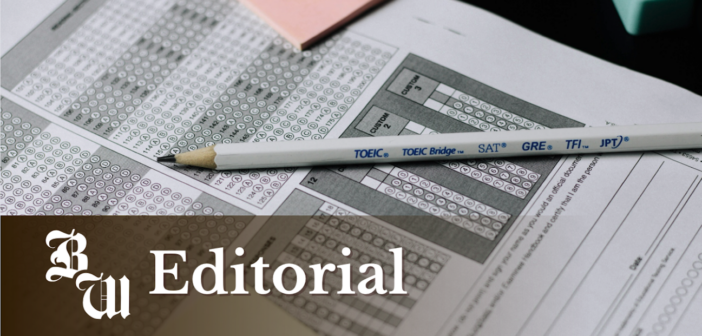It’s safe to assume that for many Lehigh students, taking the SAT or ACT was a big part of the college preparation process.
Despite being an almost ubiquitous part of the pre-college experience, these standardized tests do little more than measure how well you can take the test. And there’s plenty of research to show that wealthier students have access to better schools, tutors and strategies for maximizing their scores.
According to U.S. News, over 1,900 schools will not require applicants to submit standardized test scores for the fall 2024 applications.
However, elite schools like Yale University and Dartmouth College are going back to requiring them. We believe there may be a simple solution to easing the inequities these tests create.
This solution is having more resources for high school students who can’t afford to take a preparation course or take the tests over again. If students from lower income communities don’t have the resources to excel at standardized tests, it may deter these students from attending prestigious schools.
In June of 2023, the Supreme Court ruled that affirmative action in college admissions violates the Equal Protection Clause. With this, admissions officers can no longer consider a student’s race when determining whether to admit the person to the school. As a result, there’s been a looming concern that removing affirmative action will negatively impact historically marginalized students.
In combination with limited access to resources for standardized tests, removing affirmative action is a disservice to underprivileged students. Even without affirmative action, it’s possible students could benefit from standardized testing if it were more equitably implemented. The University of California Standardized Test Task Force reviewed testing as a college admission tool for a year and found standardized tests to be the best predictor of a student’s first-year success. The Task Force also found that submitting scores does not worsen disparities for underrepresented and low-income applicants, and eliminating standardized testing would deny automatic admission to 40% of African American students currently admitted to the University of California universities.
Although we don’t want college admissions councils to define an applicant solely by their score, standardized tests could contribute to a holistic review of the application. Students who have similar high school grades and who may not be set apart from their resumes may differentiate themselves through their standardized test scores.
However, We should moniter the amount of pressure on students for standardized tests.
A study conducted by the Journal of Literary Research concluded teachers and parents report “high-stakes tests” create higher levels of anxiety, while creating lower levels of confidence in elementary students, damaging children’s self-esteem.
But this pressure from elementary school through college doesn’t have to exist. Deemphasizing “high stakes tests,” regardless of whether or not they are considered in college admissions, can help ease the burden for students and contribute to a more equitable admissions process.
When we say admissions should give a “holistic” review of applications, what does that really mean? In a perfect world, that would mean each component of an application is fairly considered.
Yet, the weight of each of the factors considered in admissions, such as academic background, essays and standardized testing (if submitted) are left unsaid.
As seen with the 2019 “Varsity Blues Scandal,” extreme affluence can influence the admissions process, whether that takes the form of “paying your way in,” having a prominent family name or being a legacy at a school. We question whether admissions committees prefer an intelligent-on-paper yet less affluent student who may be a successful alumnus, versus a student who has a rich family that can provide continuous donations.
One suggestion is putting greater significance on personal essays, supplemental essays and giving students a chance to interview, rather than defining students by a set of statistics.
Schools should consider standardized tests when admitting students as one factor among many. Additionally, removing the top-down equalizer of affirmative action should translate into bottom-up measures like more public resources for preparation courses for the ACT and SAT, such as Khan Academy, which provides free SAT preparation.
Given resources, the submission of standardized tests can help underprivileged students attend better colleges and become successful thereafter.






Comment policy
Comments posted to The Brown and White website are reviewed by a moderator before being approved. Incendiary speech or harassing language, including comments targeted at individuals, may be deemed unacceptable and not published. Spam and other soliciting will also be declined.
The Brown and White also reserves the right to not publish entirely anonymous comments.